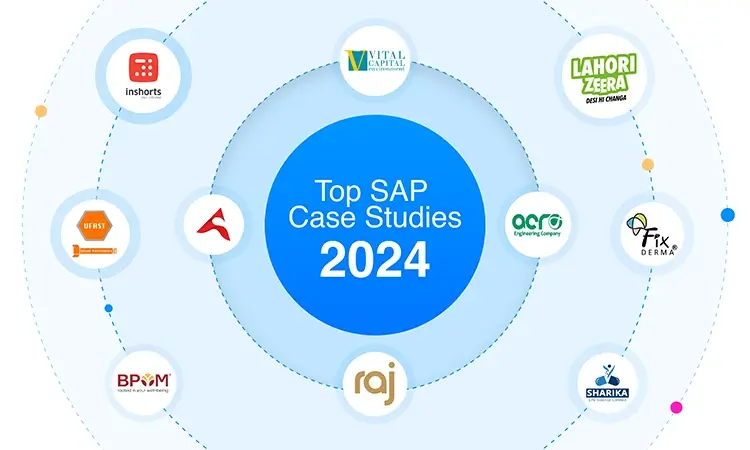SAP Business One is a widely-used enterprise resource planning (ERP) system that offers a range of features and functionalities to streamline business operations. However, implementing SAP Business One can be a complex and challenging task.
As SAP Business One implementation guide, we will explore some of the common SAP Business One implementation challenges that organizations face and also walk you through the strategies to overcome them. By understanding these challenges and addressing them to the right technology consultants, you can ensure a successful SAP Business One implementation and maximize the benefits of this powerful ERP system.
SAP Business One Implementation Checklist
Legacy and Lagging Systems
One of, the primary challenge enterprises deal with which implementing SAP Business One in their systems are legacy systems. Many businesses have heavily customized their existing ERP systems to cater to their unique requirements. However, these customizations often result in a sluggish ERP that lacks agility and cannot effectively support modern business needs.
Disconnect from Business Value
Another SAP Business One implementation challenge is relation between business and technology leaders. In some cases, SAP Business One is seen purely as a functional system rather than an innovation engine. This mindset hinders the realization of SAP Business One’s full potential.
Migrate or Transform?
Migrating to the latest version of SAP Business One can be a time-sensitive process, requiring careful planning and execution. On the other hand, transforming the ERP system involves rethinking and optimizing business processes to align with SAP Business One.
Plastering over Processes
A common SAP implementation fails is overlooking process optimization. Technology alone cannot fix inefficient processes; organizations must address process issues before introducing SAP Business One. This involves conducting a thorough analysis of existing processes, identifying bottlenecks, and reengineering workflows.
Data Disasters
Effective data management is crucial for averting SAP implementation failures. However, fragmented ERP systems can make it challenging to consolidate, cleanse, and derive meaningful insights from data.
Security Concerns
Data security is a top priority for businesses, and SAP Business One implementations must adhere to stringent security standards. Establishing clear access controls and implementing robust security measures are essential for compliance with regulations and protecting sensitive data.
When Business Pioneers Speak
Mr. Ankit Khandelwal, Managing Director, of Usha Fasteners shares his experience of challenges the organization faced while implementing SAP in their business. He also, torched on how essential it becomes to have a technology partner by your side for conducting a smooth SAP transformation. Get to hear some interesting SAP transformation stories from him.
How Technology Consultants Help in Overcoming SAP Implementation Challenges
To overcome the ERP implementation failures mentioned above and ensure a successful SAP Business One implementation, you should engage with SAP Business One consultants and experts who have in-depth knowledge of the SAP Business One system.
Here are the advantages technology consultants bring to your journey:
- Thorough Planning: Effective planning is critical for a smooth SAP Business One implementation. This includes defining project objectives, establishing realistic timelines, and allocating resources appropriately. A phased approach to implementation can help manage risks and ensure a successful outcome.
- Business Process Review: Before implementing SAP Business One, technology consultants conduct a comprehensive review of existing business processes. They identify areas that can be optimized and aligned with SAP Business One
- Change Management: Implementing SAP Business One involves significant changes to business processes and workflows. Technology consultants help in communicating the benefits of SAP Business One implementation to employees, provide training and support, and address any concerns or resistance to change.
- Data Migration and Integration: Consultants help you to develop a comprehensive plan to migrate data from existing systems to SAP Business One, ensuring data accuracy, completeness, and integrity. Integration with other systems should be carefully considered to ensure seamless data flow and eliminate data silos.
- Testing and Quality Assurance: Thorough testing is crucial to identify and resolve any issues before going live with SAP Business One. Technology consultants develop a robust testing strategy, including unit testing, integration testing, and user acceptance testing. This helps uncover any system defects, ensure data accuracy, and validate business processes.
- Training and Knowledge Transfer: Consultants provide comprehensive training to employees to ensure they are proficient in using SAP Business One. This includes training on system functionalities, data entry, reporting, and any customized features. Knowledge transfer from SAP Business One consultants to internal IT teams is also essential for ongoing system maintenance and support.
- Continuous Improvement: SAP Business One implementation is not a one-time event but an ongoing journey. Regularly reviewing and evaluating system performance, identifying areas for improvement, and implementing enhancements optimize business processes. Technology consultants stay updated with SAP Business One releases and new features to leverage the full potential of the system.
By following an experienced and dedicated technology consultant for your business and addressing the common challenges faced during SAP Business One implementation, you can maximize the benefits of SAP Business One and drive business growth. With careful planning, effective change management, and ongoing support, SAP Business One can become a powerful tool to streamline your operations, enhance decision-making, and achieve the success of your business.
Partner with Uneecops, one of the best SAP Business One partners to simplify your business operations. With right partnership you can improve business agility and prevent data silos by seamlessly integrating SAP Business One into your business landscape.







